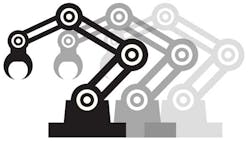Fifty years ago, on a trip to China, the renowned Chicago economist Milton Friedman was shown some of the country's noteworthy public works programs in which hundreds of laborers were digging a canal with shovels. When he asked his hosts why they weren't relying on earth-moving equipment, the officials responded that their strategy created more jobs. "In that case," he famously retorted, "why don't you replace the shovels with spoons?"
The debate over the impact of machines on employment has raged for centuries. But recent technological advances have given the debate renewed fervor.
On one side you have economists like Rob Atkinson at the Information Technology & Innovation Foundation and MIT's David Autor telling us to relax, that this is nothing new, and in the long run automation will create new jobs and raise living standards.
On the other side you have academics like Columbia University's Jeffrey Sachs and Boston University's Seth Benzell warning of the potential destruction of the middle class by robots. Research firms like Gartner are even projecting the loss of a third of all jobs to automation by the mid-2020s.
What, Me Worry?
Why the anxiety? Computers and robots have made remarkable advances into the workforce in recent years, not only on the factory floor but also in law offices, banks and motor vehicles. Not that it's the first time technology has replaced humans in the workplace. Mechanical looms took the place of artisans 200 years ago. The rise of personal computers reduced the need for secretaries 30 years ago. These advances in automation took a toll on specific professions and industries but raised our living standards overall.
The difference today is that changes seem to be coming much faster than before. We live in a time of exponential growth in technology, what MIT's Andrew McAfee and Erik Brynjolfsson brand the "Second Machine Age." As with other technological revolutions, automation is at the heart of the transformation. But this time around, digitalization is dramatically reducing transaction costs and helping spread change farther and faster than ever before.
The economics is straightforward: Automation allows people to complete tasks faster with fewer errors at cheaper costs.
Few can deny the benefits that these advances have brought to society since 2000. The economics is straightforward: Automation allows people to complete tasks faster with fewer errors at cheaper costs. This increases productivity, which means people don't have to spend as much time or money to accomplish tasks, which generates new wealth for society. True, if your job was eliminated through automation, you are personally less wealthy. That's the painful side of economic disruptions.
Automation and the Workforce
That relates back to the question of how automation will affect the workforce in coming years. While most high-skill jobs requiring problem-solving and creativity are safe, and many low-skill jobs seem resilient to automation, Autor thinks middle-skill jobs like machinists and bookkeepers are most at risk. As it is, he calculates a decline in these kinds of jobs from 60% of the U.S. economy in Jimmy Carter's term in the White House to 46% by Barack Obama's second term.
This is corroborated by a recent study published by the research group Third Way. Economists Henry Siu of the University of British Columbia and Nir Jaimovich of Duke University categorized the kinds of jobs that were created and eliminated over the past few decades. What they found was that over the past two recessions, all job growth has come from what they call "non-routine" jobs, both manual (like home health aides) and cognitive (like computer programming). On the other hand, routine jobs are down 5% since the most recent recession.
Still, while automation and robotics have made tremendous advances -- for example, Siri's language interface and Google's driverless car are two milestones many thought would not be met this quickly -- there are large hurdles that preclude robots' world domination. While robots are highly efficient at applying math to do routine tasks, humans are able to complement their robot "colleagues" with non-programmable capabilities, such as the ability to be flexible and adaptable, interact effectively with humans, and use judgment and common sense to solve unexpected problems.
As Dr. Siu surmises, "We'll do what we've always done. Human skills will adapt. We'll move toward our comparative advantage."
About the Author

Stephen Gold
President and Chief Executive Officer, Manufacturers Alliance
Stephen Gold is president and CEO of Manufacturers Alliance. Previously, Gold served as senior vice president of operations for the National Electrical Manufacturers Association (NEMA) where he provided management oversight of the trade association’s 50 business units, member recruitment and retention, international operations, business development, and meeting planning. In addition, he was the staff lead for the Board-level Section Affairs Committee and Strategic Initiatives Committee.
Gold has an extensive background in business-related organizations and has represented U.S. manufacturers for much of his career. Prior to his work at NEMA, Gold spent five years at the National Association of Manufacturers (NAM), serving as vice president of allied associations and executive director of the Council of Manufacturing Associations. During his tenure he helped launch NAM’s Campaign for the Future of U.S. Manufacturing and served as executive director of the Coalition for the Future of U.S. Manufacturing.
Before joining NAM, Gold practiced law in Washington, D.C., at the former firm of Collier Shannon Scott, where he specialized in regulatory law, working in the consumer product safety practice group and on energy and environmental issues in the government relations practice group.
Gold has also served as associate director/communications director at the Tax Foundation in Washington and as director of public policy at Citizens for a Sound Economy, a free-market advocacy group. He began his career in Washington as a lobbyist for the Grocery Manufacturers of America and in the 1980s served in the communications department of Chief Justice Warren Burger’s Commission on the Bicentennial of the U.S. Constitution.
Gold holds a Juris Doctor (cum laude) from George Mason University School of Law, a master of arts degree in history from George Washington University, and a bachelor of science degree (magna cum laude) in history from Arizona State University. He is a Certified Association Executive (CAE).
